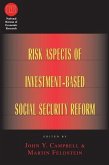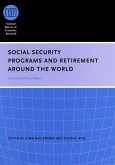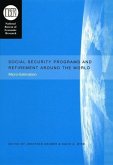Social security is one of the largest and one of the most popular programs administered by the United States government. It is also under significant pressure to reform: given projected increases in both individual life expectancy and the sheer number of retirees, the current system faces the possibility of an eventual overload. Alternative proposals have emerged, ranging from reductions in future benefits to a rise in tax revenue to various forms of investment-based personal retirement accounts. As this volume suggests, the distributional consequences of these proposals are substantially different, and may disproportionately affect those groups who depend on social security to avoid poverty in old age. Together, these studies persuasively demonstrate that appropriately designed investment-based social-security reforms could effectively reduce the long-term burden of an aging society on future taxpayers, increase the expected future income of retirees, and mitigate poverty rates among the elderly.
Hinweis: Dieser Artikel kann nur an eine deutsche Lieferadresse ausgeliefert werden.
Hinweis: Dieser Artikel kann nur an eine deutsche Lieferadresse ausgeliefert werden.








